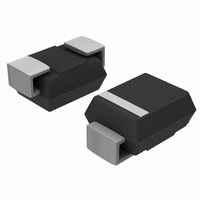P6SMB36CAT3G ON Semiconductor, P6SMB36CAT3G Datasheet - Page 4

P6SMB36CAT3G
Manufacturer Part Number
P6SMB36CAT3G
Description
TVS ZENER BIDIRECT 600W 36V SMB
Manufacturer
ON Semiconductor
Datasheet
1.P6SMB15CAT3G.pdf
(6 pages)
Specifications of P6SMB36CAT3G
Voltage - Reverse Standoff (typ)
30.8V
Voltage - Breakdown
34.2V
Power (watts)
600W
Polarization
Bidirectional
Mounting Type
Surface Mount
Package / Case
DO-214AA, SMB
Polarity
Bidirectional
Clamping Voltage
49.9 V
Operating Voltage
30.8 V
Breakdown Voltage
34.2 V
Termination Style
SMD/SMT
Peak Surge Current
12 A
Peak Pulse Power Dissipation
600 W
Maximum Operating Temperature
+ 150 C
Minimum Operating Temperature
- 65 C
Dimensions
3.81(Max) mm W x 4.57(Max) mm L
Lead Free Status / RoHS Status
Lead free / RoHS Compliant
Other names
P6SMB36CAT3GOS
P6SMB36CAT3GOS
P6SMB36CAT3GOSTR
P6SMB36CAT3GOS
P6SMB36CAT3GOSTR
Available stocks
Company
Part Number
Manufacturer
Quantity
Price
Company:
Part Number:
P6SMB36CAT3G
Manufacturer:
ON
Quantity:
37 500
Part Number:
P6SMB36CAT3G
Manufacturer:
ON/安森美
Quantity:
20 000
RESPONSE TIME
placed in parallel with the equipment or component to be
protected. In this situation, there is a time delay associated with
the capacitance of the device and an overshoot condition
associated with the inductance of the device and the inductance
of the connection method. The capacitive effect is of minor
importance in the parallel protection scheme because it only
produces a time delay in the transition from the operating
voltage to the clamp voltage as shown in Figure 4.
time (time required for the device to go from zero current to full
current) and lead inductance. This inductive effect produces an
overshoot in the voltage across the equipment or component
being protected as shown in Figure 5. Minimizing this
overshoot is very important in the application, since the main
purpose for adding a transient suppressor is to clamp voltage
spikes. The SMB series have a very good response time,
typically < 1 ns and negligible inductance. However, external
inductive effects could produce unacceptable overshoot.
Proper circuit layout, minimum lead lengths and placing the
In most applications, the transient suppressor device is
The inductive effects in the device are due to actual turn-on
APPLICATION NOTES
http://onsemi.com
4
suppressor device as close as possible to the equipment or
components to be protected will minimize this overshoot.
prevent overstress of the protection device. This impedance
should be as high as possible, without restricting the circuit
operation.
DUTY CYCLE DERATING
and at a lead temperature of 25°C. If the duty cycle increases,
the peak power must be reduced as indicated by the curves of
Figure 6. Average power must be derated as the lead or ambient
temperature rises above 25°C. The average power derating
curve normally given on data sheets may be normalized and
used for this purpose.
in error as the 10 ms pulse has a higher derating factor than
the 10 ms pulse. However, when the derating factor for a
given pulse of Figure 6 is multiplied by the peak power value
of Figure 1 for the same pulse, the results follow the
expected trend.
Some input impedance represented by Z
The data of Figure 1 applies for non-repetitive conditions
At first glance the derating curves of Figure 6 appear to be
in
is essential to








